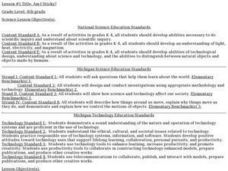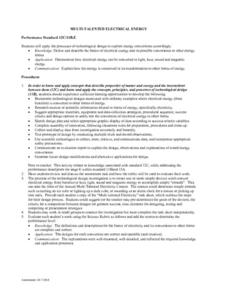Curated OER
Sorting and Using Materials
Learners explore materials and their properties. In this matter lesson, students identify objects and describe their properties. Learners test and sort materials using an interactive whiteboard, followed by a group discussion of what was...
Alabama Learning Exchange
Properties of Minerals
High schoolers explore the basic building blocks of our planet. In this minerals lesson learners begin the process of forensics on the basis of investigation and drawing conclusions from observations.
Curated OER
Harnessing Solar Energy
Students discover the properties of light (radiant) energy from the sun by experimenting with solar collectors, cookers, and calculators. After a lecture/demo, students create their own solar collectors and test their efficiency.
National Institute of Open Schooling
d-Block and f-Block Elements
Potassium permanganate, containing manganese one of the transition elements, has many uses such as mouthwash and propelling rockets, making it is a very diverse compound. The lesson delves into such transition elements and lanthanides,...
Curated OER
Waste Aggregates and Material Properties
Students define specific waste materials that could be used as aggregate in concrete. For this aggregate and waste lesson plan, students brainstorm on how to incorporate waste in construction and define different aggregate materials.
Curated OER
We're Off To the Races!
Second graders use a magnet to "race" objects from one side of a racing track to another. They predict what the results are, then run the race. Pupils sort and graph which items were successfully moved, they attempt to race again. This...
Curated OER
Ring-A-Ding-Ding!
What sound does metal make when you hit it? Kindergartners and first graders conduct an experiment about the properties of metal. First, they draw a line between metal items and descriptions of each. Next, they use a magnet to see which...
Virginia Department of Education
Isotopes
Lead your class through the amazing world of isotopes as they investigate the various properties they contain and further understand their respective location on the periodic table. They explore half-lives and radioactivity as each...
Cornell University
Glued into Science—Classifying Polymers
Explore the unique characteristics of polymers. A complete instructional activity begins with a presentation introducing polymers. Following the presentation, young scientists develop a laboratory plan for creating substances using...
Texas State University
Earth: Deposition and Lithification
Geology geniuses analyze sediment samples with a hand lens and sort according to physical characteristics. They also learn about the processes of cementation, compaction, and lithification within the rock cycle. The lesson plan is...
Curated OER
Rocks and Minerals
Review the difference between rocks and minerals using this resource. Learners identify and investigate the physical properties of these objects. They create a Venn diagram to compare and contrast types of rocks. This is a motivating way...
Buffalo State
A Five Day Approach to Using Technology and Manipulatives to Explore Area and Perimeter
Young mathematicians build an understanding of area and perimeter with their own two hands in a series of interactive geometry lessons. Through the use of different math manipulatives, children investigate the properties of rectangles,...
Curated OER
How to Be "Naturally Attractive" (Without Even Trying)
Pupils examine the various properties of magnets, explain how a compass works and make an electromagnet. They also experiment with magnetic lines-of-force using paper and iron filings.
Curated OER
Am I Sticky
Fourth graders become familiar with magnets and their properties. They investigate what items are magnetic and non-magnetic and make generalizations about the properties. They utilize technology to develop an interactive digital book.
Curated OER
What a Can Can Do
Students explore the properties of a can. In this aluminum science lesson, students conduct various experiments to identify properties of aluminum. Students examine the appearance, temperature, and corrosion resistance of aluminum.
Curated OER
Multi-Talented Electrical Energy
Students explore energy conversions by demonstrating the conversion of electrical energy into light, heat, sound, and magnetic energy. Students create a simple device that converts electrical energy from batteries to heat, light, sound...
Curated OER
Characteristics of Materials
Students describe and compare common properties of various classroom materials. In this science/matter activity, students observe common classroom items and the materials they are made of to complete a list of common properties.
Curated OER
Properties of Light
In this light spectrum worksheet, students will read a diagram and a chart listing information about the different types of light rays from Gamma rays to radio waves. Then students will write a short essay about a new life-form that...
Curated OER
Magnetism: Magnet, Magnet, Where are you?
Students study the characteristics of magnets including polarity, and the concepts of attraction and repulsion. They examine how magnets are used industry.
Curated OER
Grain Properties Activity
Students study the similarities and differences of five different grains. They analyze the characteristics of corn, sunflower, milo, wheat, and soybeans.
Curated OER
Electricity/Magnetism
Second graders experiment with ballons to see which objects will cling and which objects will not. They use an assortment of objects, paper clips, pennies, button, scraps of paper, or puffed cereal. They make predictions and record results.
Curated OER
Are These Made of Metal?
How can you tell if something is made of metal? Use a table of data and a science experiment to determine which items are made of metal. The experiment requires adult supervision, as it instructs third graders to build an electrical...
Curated OER
11 - The Heat Is On
Students observe physical change of melting by observing substance in original state, melting substance, allowing substance to return to original temperature, determining if substance retained its original properties, and recording results.
BBC
Sorting and Using Materials
First and second graders see that everyday objects are made from a variety of materials. They interact with objects such as keys, plastic spoons, a wooden ruler, a towel, and a plastic bag. A discussion ensues which leads them to...

























